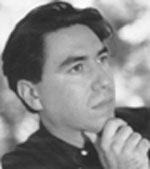Julian Wachner - Composer Conductor by Wah Keung Chan
/ March 2, 2003
Version française...
 Composers who are successful conductors are not that
common. Gustav Mahler and Leonard Bernstein are probably the best examples. With
a stirring performance of the Monteverdi Vespers in February, McGill's Julian
Wachner is making a case for this rare double career. Composers who are successful conductors are not that
common. Gustav Mahler and Leonard Bernstein are probably the best examples. With
a stirring performance of the Monteverdi Vespers in February, McGill's Julian
Wachner is making a case for this rare double career.
Wachner, who has considered himself a composer since writing a Te Deum at age 6,
has been conducting for about 15, years after receiving much encouragement. Last
year the 33-year old maestro arrived from years of study in Boston and took over
as head of McGill's choral department. He had already amassed a prolific oeuvre
of 50 compositions --soon to be published by Schirmer--many studio recordings,
and excellent reviews as a conductor.
"Being a conductor is the hardest thing in the world. One has to combine the
right gesture, a wealth of knowledge, the ability to inspire people and the
vision to put together projects or seasons. The act of composition is a solitary
activity; it is such a different mindset," said Wachner, who prides himself as
very much a composer's advocate. "Gunter Schuller's book The Complete
Conductor blew the whistle on the major conductors and how they were
distorting the masterpieces. As a composer, I am able to anticipate the
direction another composer is taking, and it helps me better understand the work
as a conductor."
Wachner's breakthrough as a
conductor came two years ago when he met Emmanuel Viaumme at the Spoleto
Festival. "His approach was just so wonderfully alive, and he gave me a new
prioritizing of why we are making music. I think my generation has a different
view on performance because of recordings. Particularly in early music which are
recorded closely and perfectly, we need to rediscover what it is like to make
music with other human beings. There has been a big change for me in how I
approach rehearsals and the act of performing in concerts.
"So much of what I'm doing is
highly architectural, much like taking a building apart and rebuilding it. How
the different players work together. Why the cello references the horn line and
affects how the altos sing. I try to integrate scholarship with a real
expressive intuitive manner of music-making."
Wachner's strength lies outside
the 19th century, in composers such as Macaut, Dubrec, Ockeghem, French
polyphony and the 20th century. "I view the 19th century through the lens of the
17th and 18th centuries. I'm aware that Brahms is a Schütz fanatic. Then the
idea of tactus means something; all of his links to polyphony that labelled him
a stodgy classicist by the Wagnerites. There is an element of creating something
really new by going back to the old, by putting a 19th century harmonic
vocabulary on it. Many of the harmonies that are so radical are really 15th and
16th century style and harmonies. I try to look at a bigger rhythmic sense than
taking more rubato; a more vital sense of rhythm and pulse is very important in
the 19th century."
How does conducting affect his
composition? "My music became much more accessible. I was writing some really
wild stuff, and now I like to have my music have an audience, with a balance
between sincerity and accessibility. It's post-Bernstein, it's a rich sort of
French harmonic vocabulary with a New York City rhythmic energy to it, with
melodies, tunes, lots of lydian and octotonic scales."
Wachner recently took up the
prestigious post of musical director of the Church of St. Andrew's and St.
Paul's. "I grew up with liturgical music, and I don't think I can do without it.
I find that I need to be very busy in order for me to be inspired creatively in
composition."
Julian Wachner directs the Church of St. Andrew
and St. Paul Choir in Bach's St. John Passion on March 16 at 4 p.m. Freewill Offering.
514-842-3431
Read his thoughts on the St. John Passion
Version française... | 

